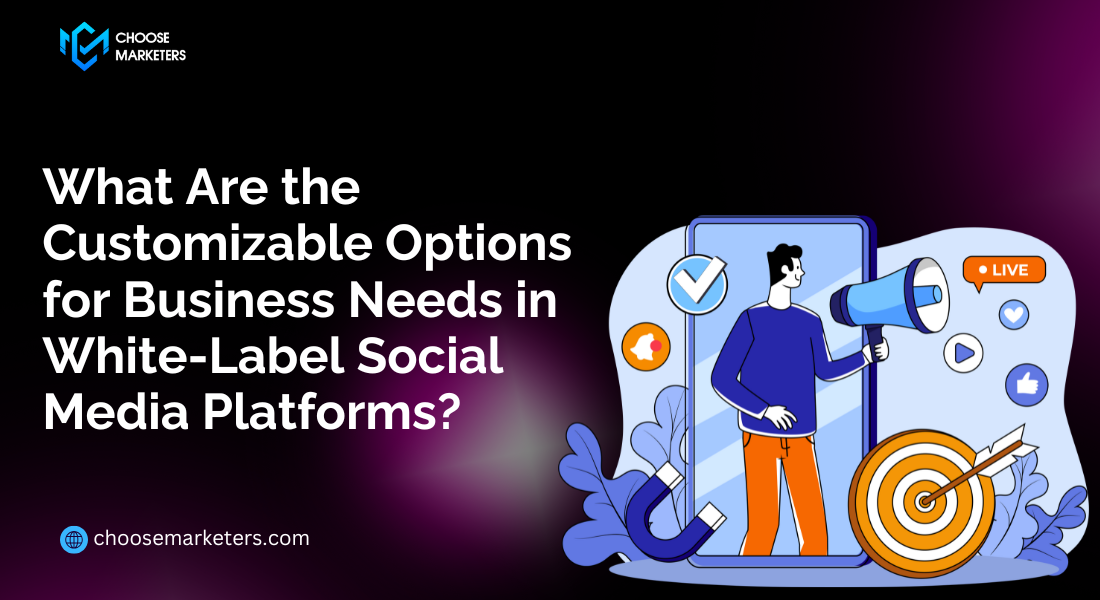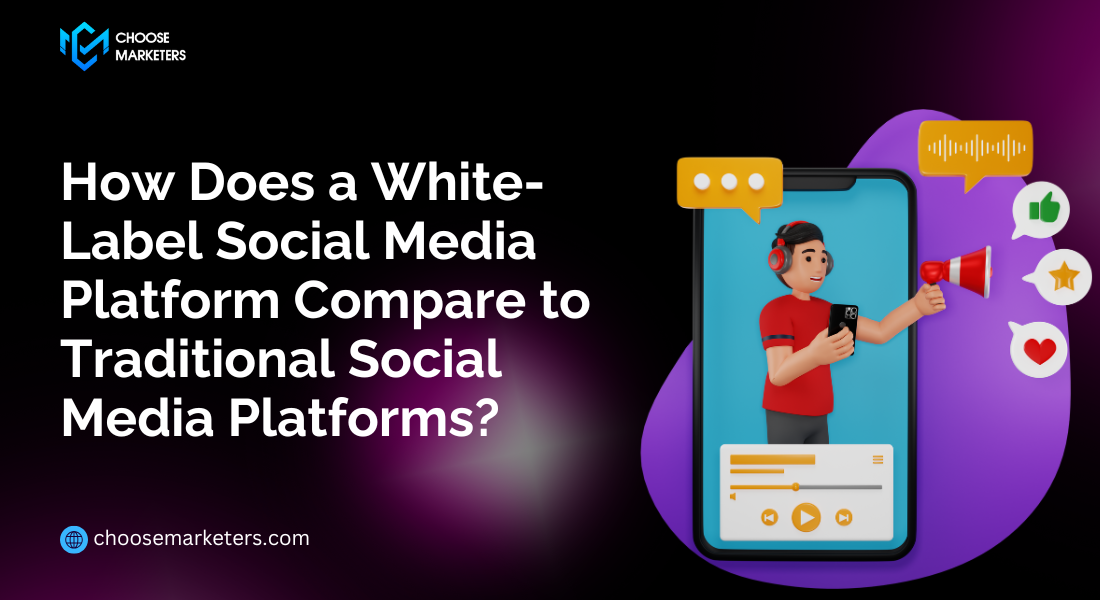

Best White-Label Social Media Platforms for 2024

What is a White-Label Social Media Platform?
A white-label social media platform is a customized social networking solution that allows companies to create their own branded, private community. Unlike public social media networks, white-label platforms are built specifically for organizations that want to host exclusive interactions under their brand identity. These platforms allow businesses to adapt the social experience by adding branding, custom designs, and features specific to their target audience, enhancing user engagement and brand loyalty. By building a white-label social community, brands can strengthen connections with users without distractions or ads seen on public platforms.
How White-Label Social Platforms Work
White-label social media platforms are designed with flexibility, offering features that let companies set up and manage their own branded space. Many of these platforms are built with pre-existing templates that companies can adjust, allowing them to control everything from visual themes to privacy settings and moderation rules. This setup ensures that businesses can tailor the social experience to meet the specific needs of their community.
Advantages of Using White-Label Social Platforms
One of the main benefits of white-label platforms is that they offer full control over user interactions, data, and content. This level of customization is especially valuable for industries such as education, healthcare, and finance, where privacy and data security are essential. Moreover, brands such as Choose Marketers find value in these platforms for their clients by providing exclusive, engaging experiences that foster loyalty and build strong communities without distractions from outside advertisements.
Why Choose a White-Label Social Network?
Opting for a white-label social network offers unique benefits, especially for businesses seeking a customizable, branded online community. Unlike traditional social media platforms, a white-label network lets companies maintain a fully branded experience while providing features tailored to their users’ needs. This flexibility allows businesses to design an interactive space with a look, feel, and functionality that aligns directly with their brand, ensuring a seamless user experience and stronger brand identity.
Branding and Control Over User Experience
With a white-label network, businesses can create a distinctive community space that reflects their unique brand, from logos and color schemes to customized user interfaces. This control extends to privacy and content moderation, where companies can manage the platform’s environment according to their specific standards. For companies like Choose Marketers, this degree of branding and customization helps build trust with users, ensuring a unified and professional presence without the distractions of third-party ads or unrelated content.
Data Ownership and Privacy
One of the most compelling reasons to choose a white-label social network is the ownership of user data. Unlike mainstream social media sites where data often belongs to the platform, white-label solutions grant companies full control over their data. This means that organizations can prioritize user privacy, a particularly valuable aspect in regulated industries like healthcare or finance. With this control, companies can build a secure environment that protects user information and aligns with privacy laws and compliance standards.
Enhanced Engagement and Community Building
White-label platforms foster deeper connections by allowing organizations to create specialized communities for their audience. Features such as exclusive content, custom notifications, and unique engagement options (like polls, discussion boards, and private messaging) can be incorporated to drive interaction. A branded community also enhances customer loyalty by keeping users within an ecosystem designed specifically for them, leading to increased engagement and brand advocacy.
What Are the Customizable Options for Business Needs in White-Label Social Media Platforms?
White-label social media platforms offer a wide range of customizable options that allow businesses to tailor the platform to their unique needs. These customizable features are vital for ensuring that the platform aligns with the company’s brand identity, operational goals, and user engagement strategies. Below are some of the customizable options that businesses can leverage to create a personalized social media experience.

Custom Branding and Visual Identity
White-label platforms provide businesses with the ability to implement their branding, including logos, color schemes, and layouts. This customization ensures that the platform reflects the company’s branding guidelines, providing a consistent experience for users that strengthens brand recognition. Whether you are building a community for your business, educational institution, or social network, branding options such as theme color changes and logo uploads help create a seamless brand experience across all touchpoints.
Flexible User Interface Design
A user-friendly and adaptable interface is crucial for the success of any social media platform. White-label solutions allow businesses to customize the layout, navigation, and design elements to create an intuitive and engaging experience. The platform’s interface can be optimized for ease of use, making it easy for users to find content, engage with other members, and interact with the features they need most.
Content Creation and Moderation Tools
Customizing content creation tools and moderation features is another important aspect of white-label platforms. Businesses can personalize these tools to allow their users to share a wide variety of content, such as text posts, images, videos, and live streams. Additionally, moderation tools can be configured to align with a company’s content policies and community guidelines, ensuring that users have a safe and respectful space for interaction. Businesses can adjust the level of control they have over content moderation, from manual review to automated filtering systems.
Monetization Capabilities
For businesses looking to generate revenue through their white-label social media platform, customization of monetization options is key. Many white-label platforms offer the flexibility to integrate subscription models, advertising, paid memberships, and other monetization strategies. Companies can customize pricing tiers, access levels, and promotional content to create revenue streams while maintaining a high level of user satisfaction.
Integration with Business Tools and CRM Systems
Customizing the integrations with business tools and customer relationship management (CRM) systems is another significant feature of white-label platforms. Companies can integrate their social platform with email marketing, analytics, customer service tools, and more. This integration helps streamline operations and enhances the overall experience by allowing businesses to manage their community and customer interactions from a single dashboard.
Advanced Analytics and Reporting Dashboards
Businesses can also personalize reporting and analytics dashboards to track the specific metrics that matter most to them. Whether it’s user engagement, content performance, or community growth, customizing these analytics tools provides businesses with valuable insights to optimize their strategies. White-label platforms often allow for tailored reports that highlight the KPIs relevant to business goals, enabling data-driven decision-making.
What Are the Top White-Label Social Media Platforms to Consider?
When it comes to selecting a white-label social media platform for your business, it’s essential to choose a platform that offers the right features, scalability, and customization options. Below are some of the top white-label social media platforms you should consider, each offering unique features that cater to different business needs.
1. BuddyPress
BuddyPress is a popular open-source plugin for WordPress that transforms your website into a fully functional social network. It provides a comprehensive set of social features such as user profiles, activity streams, and messaging. As a white-label solution, BuddyPress allows for extensive customization, making it an excellent choice for businesses looking to create a community-driven social network on their WordPress site.
2. SocialEngine
SocialEngine offers a white-label social networking platform that is known for its flexibility and scalability. It supports various community-building features, such as activity feeds, user profiles, groups, and messaging. With robust customization options, SocialEngine allows businesses to create a highly personalized experience for their users while maintaining complete control over the platform’s design and functionality.
3. Hivebrite
Hivebrite is a versatile white-label platform tailored for building private social networks and online communities. It is ideal for businesses, alumni associations, or niche communities that need a secure and scalable platform. Hivebrite offers features like event management, membership directories, and advanced analytics, making it an excellent choice for businesses seeking an all-in-one solution for engagement and community building.
4. Mobilize
Mobilize offers a modern white-label platform for creating private communities and communication spaces. It is designed for businesses that require a highly interactive platform with features like messaging, event planning, content sharing, and member management. Mobilize integrates well with other business tools, allowing businesses to manage their community while tracking engagement metrics.
5. Khoros Communities
Khoros Communities is a robust platform that specializes in community engagement and customer support. It provides a white-label solution for businesses seeking to build a customer-centric online community. Khoros offers features such as discussion forums, knowledge bases, and AI-driven support tools. It is ideal for businesses that want to foster deeper customer relationships and provide a seamless experience across all touchpoints.
6. Disciple Media
Disciple Media allows businesses to create their own branded social network, enabling them to engage users through a white-label platform. The platform supports features such as live chat, events, video content, and e-commerce. Disciple is particularly useful for businesses that want to build a strong community while offering monetization opportunities through paid memberships or content.
7. Muut
Muut is a white-label social media platform designed for building modern forums and communities. It provides a clean, minimalist interface and supports features like real-time conversations, topic-based discussion threads, and user profiles. Muut’s simplicity and ease of use make it an excellent choice for businesses looking to create a straightforward social experience with minimal setup.
8. Mighty Networks
Mighty Networks is a powerful platform for businesses wanting to create branded social networks. It is known for its easy-to-use interface and deep integration with online courses, membership programs, and events. Mighty Networks is perfect for businesses looking to build a community around their content and brand while offering premium content and monetization options.
9. SocialEngine PHP
SocialEngine PHP is a white-label social media platform built on PHP, designed for creating customizable and feature-rich social networks. It offers a wide range of plugins and extensions that can be tailored to meet business needs, including group discussions, activity streams, and private messaging. SocialEngine PHP is ideal for businesses looking for a more flexible and customizable solution.
10. Jamroom
Jamroom is a powerful platform for building community-driven websites with social media functionalities. It offers robust features such as media sharing, user-generated content, and customization options. Jamroom is a flexible choice for businesses wanting to create a user-driven social network with strong media management capabilities.
11. PlushForums
PlushForums is a white-label platform designed for building online discussion forums and communities. It supports threaded discussions, private messaging, and user engagement features. For businesses looking to create a community-based platform centered around conversations and collaboration, PlushForums offers a user-friendly and customizable solution.
12. Vanilla Forums
Vanilla Forums is a versatile community platform that provides both open-source and enterprise-level white-label solutions. It is highly customizable and offers features like multi-language support, gamification, and advanced reporting. Vanilla Forums is ideal for businesses that need a feature-rich, scalable platform to build and maintain large online communities.
13. NodeBB
NodeBB is a real-time forum software that offers a white-label solution for businesses seeking to create social networks with modern features. It supports live chat, content sharing, and easy integration with social media networks. NodeBB is known for its fast performance and scalability, making it an excellent choice for businesses with growing online communities.
14. Lithium Communities
Lithium Communities (now part of Khoros) provides a white-label social media platform designed for customer engagement and support. It offers a full suite of tools for building a social network, managing content, and fostering community-driven support. Lithium Communities is ideal for businesses seeking to enhance customer interactions through a branded social experience.
15. Invision Community
Invision Community is a feature-packed white-label platform designed for creating customizable social networks. It supports forums, blogs, galleries, and social media integrations, giving businesses the flexibility to create a dynamic social network that meets their needs. The platform also includes powerful moderation and analytics tools to help businesses manage their online communities effectively.
16. Flarum
Flarum is a lightweight and fast white-label social media platform built for simplicity and performance. It is an open-source solution that offers a sleek interface and community-building features such as discussion threads and private messaging. Flarum is ideal for businesses looking for a minimalist and scalable platform to host their social community.
17. AnswerHub
AnswerHub is a question-and-answer platform that provides businesses with a white-label solution for building communities around knowledge sharing. It offers features such as expert collaboration, content moderation, and community-driven FAQs. AnswerHub is perfect for businesses looking to create a space for users to ask questions, share knowledge, and engage with experts.
18. Higher Logic
Higher Logic offers a white-label community platform focused on building professional networks and fostering engagement. It provides tools for content sharing, event management, and online learning, making it ideal for organizations and businesses seeking to create a professional and collaborative social network.
19. XenForo
XenForo is a powerful and customizable white-label social media platform designed for businesses that want to create active online communities. It features tools for discussions, media sharing, and event management, as well as robust moderation capabilities. XenForo is perfect for businesses looking to build a social platform with a strong focus on user engagement and content moderation.
20. MyBB
MyBB is a free, open-source forum software that allows businesses to create a white-label social network with community-building features such as discussion forums, user profiles, and private messaging. This platform offers a cost-effective and easy-to-implement solution for businesses aiming to build a basic social network. With its straightforward setup and robust features, MyBB serves as an excellent choice for fostering community engagement
How Does a White-Label Social Media Platform Compare to Traditional Social Media Platforms?
When considering social media solutions for businesses, it’s essential to understand the differences between white-label social media platforms and traditional social media platforms. Both options have their own set of advantages and limitations, but they serve distinct purposes based on the specific goals of the business. Let’s explore the differences to help businesses make informed decisions.

White-Label Social Media Platforms
1. Branding and Customization
White-label platforms offer full control over the design and branding. Businesses can customize the platform to align with their brand, such as using custom logos, color schemes, and themes. This ability to adjust the user interface enhances the user experience and ensures a seamless brand presence.
2. Control Over Data and Privacy
With white-label solutions, businesses own their data. This means they have full control over how user information is stored, used, and shared, ensuring higher privacy and compliance with data protection regulations.
3. Monetization Opportunities
White-label platforms offer more flexibility for monetization. Businesses can incorporate features like membership areas, premium content, or subscription models. They can generate revenue directly from their community without the limitations set by third-party platforms.
4. Community Engagement and Control
Since the platform is owned by the business, they have the power to design the engagement features. Businesses can encourage specific interactions, such as creating events, hosting discussions, or allowing users to create their content. This level of control fosters a stronger community connection.
5. Scalability and Flexibility
White-label social media platforms are typically scalable, allowing businesses to grow without constraints. Whether it’s adding new features or expanding their user base, these platforms can adjust to the needs of a growing business.
6. Cost Considerations
While the upfront costs of white-label platforms can be high, businesses get value through full control and long-term benefits. Most platforms charge subscription fees or offer one-time purchases. However, there may be additional costs for development, maintenance, or customization.
Traditional Social Media Platforms
1. Branding and Customization
On traditional platforms like Facebook or Twitter, businesses cannot customize the core design. The branding is limited to profile and banner images. The platform’s default appearance remains unchanged for all users.
2. Control Over Data and Privacy
Traditional social media platforms typically control user data. While businesses can access insights and analytics, they don’t own the data, and the platform can share or sell user information to third parties.
3. Monetization Opportunities
Monetization on traditional platforms primarily revolves around advertisements and sponsored content. Businesses have limited flexibility for direct monetization like paid memberships or exclusive content.
4. Community Engagement and Control
Engagement is primarily driven by the platform’s algorithms. While businesses can interact with their followers, they don’t control how their content is distributed. Organic reach is limited, and businesses must rely heavily on paid ads to ensure visibility.
5. Scalability and Flexibility
Traditional platforms have scaling limitations. As a business grows, it can become more difficult to manage large communities. Additionally, the platform’s algorithms may restrict the visibility of posts unless businesses pay for ads.
6. Cost Considerations
Traditional platforms are usually free to join, but businesses face costs through advertising and promotional campaigns. If businesses want to scale, they’ll need to continuously invest in ads to maintain or improve their reach.
How Can White-Label Social Media Marketing Help to Shine Your Brand?
Businesses are increasingly turning to white-label social media platforms to boost their online presence while maintaining full control over their branding. With Choose Marketers, brands can seamlessly integrate white-label social media marketing strategies designed to elevate their online presence, alongside tailored white-label content marketing services that enhance brand storytelling. As social media apps continue to evolve and shape the digital landscape, companies need to stay ahead of the curve. Curious about how these platforms are transforming the industry? Dive deeper into the opportunities and challenges of social media apps and discover how they can propel your business forward in 2024. Feel free to connect with us on LinkedIn for more insights into optimizing your brand’s social media presence.
Frequently Asked Questions (FAQs)
1. What is a white-label social media platform?
A white-label social media platform is a pre-built social media tool or service that businesses can rebrand as their own. This allows companies to offer social media capabilities to their customers without the need to develop the technology from scratch. These platforms are customizable, ensuring that businesses can adjust the appearance, branding, and features to fit their needs while offering a seamless user experience.
2. How can a white-label social media platform benefit my business?
By using a white-label social media platform, businesses can save time and resources that would otherwise be spent developing social media technology. These platforms offer flexibility, easy integration with existing marketing strategies, and enhanced control over branding. Additionally, they provide a professional and scalable solution that helps businesses enhance engagement and improve customer satisfaction.
3. Are white-label social media platforms customizable?
Yes, one of the major advantages of white-label social media platforms is the ability to customize them. From altering the interface design to modifying features and adding tools, businesses can personalize the platform to align with their brand identity and meet their specific requirements. This customization ensures that the platform feels unique and integrated with the business’s overall marketing strategy.
4. What are the main features to look for in a white-label social media platform?
When choosing a white-label social media platform, it’s essential to focus on features like user-friendly interfaces, robust engagement tools, analytics, integration capabilities, and scalability. Additionally, platforms should support mobile functionality, provide customization options, and offer strong security measures to protect user data.
5. Can I integrate my white-label platform with existing tools?
Yes, many white-label social media platforms come with API capabilities, allowing businesses to integrate with other tools and services they already use. Whether it’s for CRM systems, email marketing tools, or e-commerce platforms, integration ensures a smooth flow of data and enhances the overall functionality of your business ecosystem.

